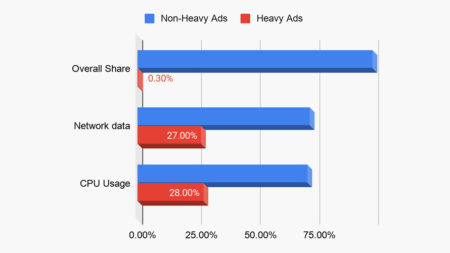Earlier this year, Google rocked the online advertising world by announcing it won’t support third-party cookies in its dominant Chrome web browser starting in 2022, in a move that will disable the core mechanisms of ad targeting.
News of the policy update sparked anxiety across the entire ad-tech ecosystem given that Google Chrome accounts for more than half of all installed web browsers, according to W3C statistics, and brings its stance in line with counterparts such as Apple’s Safari.
In the interim, the Chrome team announced that starting in August, it will start disrupting ads it deems “resource-heavy” in a subtle reminder of who holds the reins in ad tech.
“We have recently discovered that a fraction of a percent of ads consume a disproportionate share of device resources, such as battery and network data, without the user knowing about it,” Marshall Vale, a product manager at the Chrome team, wrote in a blog post announcing the update.
Therefore, Google Chrome will disrupt, or “unload,” offending ad units from a publishers’ webpage once they have reached the resource limits allotted by the web browser. (The image below depicts what this will look like on a website.)

Chrome is setting the thresholds to 4MB of network data or 15 seconds of CPU usage in any 30 second span, or 60 seconds of total CPU usage under the new terms of usage (see image below).
“While only 0.3% of ads exceed this threshold today, they account for 27% of network data used by ads and 28% of all ad CPU usage,” Vale wrote in the blog post.
Google’s Chrome team has shared a list of measures advertisers and publishers can take in preparation for the August update which could result in ads being removed from their site.
The move builds on efforts from the Google Chrome team earlier this year to lessen the disruptiveness of video ads. The research specifically called out non-skippable pre-roll ads, mid-roll units and text ads superimposed over organic content as offending items.
Several industrywide initiatives are underway ahead of Google’s 2022 update to help ad-tech companies, media buyers and publishers transition to the post-cookie world.
For instance, the IAB announced “Project Rearc” at its flagship gathering earlier this year. Although sources from the sell-side of the industry told Adweek they were not pleased with some of the measures proposed, like creating universal ad-targeting tools based on their first-party data, as part of such discussions.
https://www.adweek.com/digital/google-chrome-will-throttle-resource-heavy-ads/


